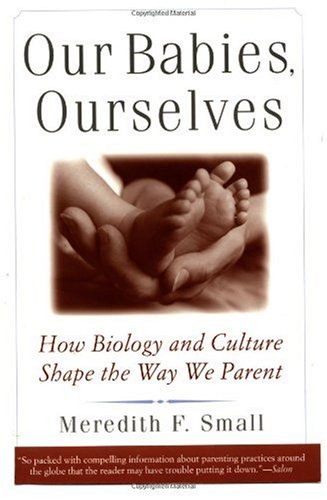The Paradox of Crying Babies
Crying is the earliest and most compelling of infant signals," writes Ronald Barr, and surely there is no sound on earth more piercing than the cry of an infant. The ability to cry was hard-wired into human babies long ago as a potent signal to get adult attention. Like other primates, human infants needed to be able to send a message of distress to motivate action on the part of someone more able. The same kind of vocal signals are found in Rhesus monkeys, for example, which have very distinguishable distress noises called "coos." During a coo, the lips protrude into an "oh" and produce a plaintive series of cries when the infant is separated from its mother. Monkey and ape babies also shriek and scream and produce a deep-throated geek noise, all as signals to others. These signals, of course, have evolved in primates and other animals because they work; the sounds bring the mother closer. Animal babies call when something threatens or frightens them, thereby making it known that, from the infant's point of view, something is terribly wrong. For humans, nothing compels a parent to do something more quickly than a child's piercing wail. And that's why crying is, in Ronald Barr's nomenclature, a paradox. It is a signal that evolved to broadcast an infant's unhappiness and motivate a parent to address the cause of its distress. But that same signal can, very easily, send parents over the edge. For example, reports of child abuse and child homicide often contain comments about a parent's or caretaker's ultimate frustration with a crying infant, and their claims that they just couldn't take it anymore. And so what evolved as an adaptive signal can be destructive under certain circumstances, which doesn't make evolutionary sense at all.
Notes:
The alarm compels the mother to care for the child, but it can also push them to abuse it.
Folksonomies: evolution parenting infancy crying
Taxonomies:
/family and parenting/babies and toddlers (0.547952)
/science/geology/seismology/earthquakes (0.375922)
/science/chemistry/organic chemistry (0.351454)
Keywords:
distinguishable distress noises (0.977162 (negative:-0.386946)), Ronald Barr (0.962202 (negative:-0.251333)), infant signals (0.864111 (neutral:0.000000)), deep-throated geek noise (0.848717 (negative:-0.717195)), Crying Babies (0.841491 (negative:-0.870804)), potent signal (0.678988 (positive:0.476540)), ape babies (0.667777 (negative:-0.717195)), vocal signals (0.667635 (negative:-0.374898)), human babies (0.667145 (positive:0.476540)), Rhesus monkeys (0.653917 (negative:-0.374898)), Animal babies (0.649607 (negative:-0.477959)), adaptive signal (0.639746 (negative:-0.712269)), adult attention (0.616108 (positive:0.476540)), human infants (0.607172 (negative:-0.352334)), plaintive series (0.605215 (negative:-0.660371)), certain circumstances (0.589605 (neutral:0.000000)), ultimate frustration (0.587792 (negative:-0.729873)), evolutionary sense (0.578061 (negative:-0.341047)), child homicide (0.574387 (negative:-0.729873)), child abuse (0.554012 (negative:-0.729873)), mother (0.510264 (negative:-0.765587)), parent (0.460183 (negative:-0.668749)), primates (0.455943 (neutral:0.000000)), paradox (0.447083 (negative:-0.746397)), example (0.416577 (negative:-0.208535)), coo (0.379847 (positive:0.370110)), wail (0.378200 (negative:-0.597688)), cries (0.376988 (negative:-0.660371)), unhappiness (0.372498 (negative:-0.678685)), caretaker (0.371328 (negative:-0.729873))
Entities:
crying infant:HealthCondition (0.952061 (negative:-0.656128)), Ronald Barr:Person (0.371617 (negative:-0.251333)), coo:JobTitle (0.277958 (positive:0.370110))
Concepts:
Primate (0.957706): dbpedia | freebase | opencyc
Infant (0.736208): dbpedia | freebase | opencyc
Monkey (0.645488): dbpedia | freebase | opencyc
Pregnancy (0.571172): dbpedia | freebase | opencyc
Ape (0.517127): dbpedia | freebase | opencyc
Rhesus Macaque (0.500600): dbpedia | yago
Human (0.496461): dbpedia | freebase | opencyc
Infancy (0.495776): dbpedia





